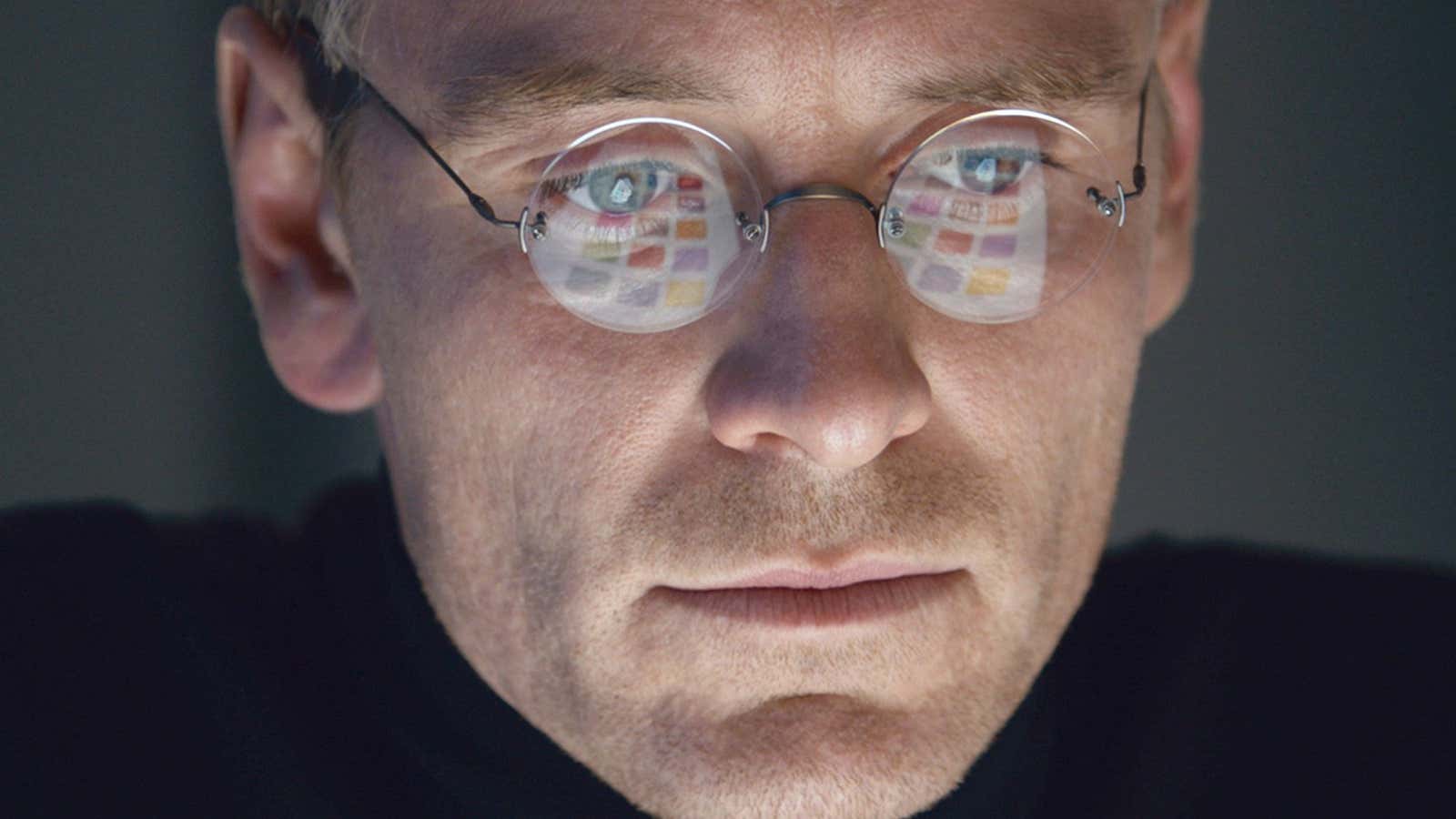The author Michael Lewis recently said he wasn’t interested in writing another book about Silicon Valley because, “It’s basically a bunch of autistic people wandering around.” Lewis went on to explain that he needs an emotional connection around which to build his narratives, and the valley just doesn’t have one.
Sometimes, it seems, people find vocations in which they try to solve the exact problems that plague their inner life. In the new movie Steve Jobs, the monumental co-founder of Apple is portrayed as a man consumed with getting his Macintosh computer, the one that looks like a smiling face, to say hello to the audience at its grand unveiling, in 1984. With minutes to go, Jobs threatens to name and shame the engineer responsible if he doesn’t make the buggy vocalizing program perform.
At another point, later in the film, Jobs, portrayed convincingly by Michael Fassbender, calls himself an “imperfect design,” by way of apology for two decades of cruelty towards his daughter Lisa. As if he were the computer, rather than the human being.
This Steve Jobs might as well be a box of circuits. His warmth, empathy, and humor seem to be mere subroutines, called on by Steve OS when they can help him put a dent in the universe. Jobs obsesses about making his computers friendly, but he is emotionally detached from everyone around him. He explains away his bad behavior as the fault of his programming, implying the real “him” would be a better man, if only the code wasn’t so buggy. But there’s no engineer he can blame for that, no one he can prod to make him perform, except himself.
Jobs, at this stage of his cinematographic postmortem, is a myth and archetype, no longer a mere human. He’s FDR and Genghis Khan, someone who will only grow larger than life, yet somehow even more unknowable, thanks to the many competing narratives that continue to emerge about him. The writer of this one, Aaron Sorkin, takes liberties with events and characters in service of a successful drama. It’s impossible for the audience to tell how much of the film’s details comport with reality.
Sorkin uses a part of Jobs’s biography, for example, to provide motive: His original adopted parents gave him back after a month. This rejection fuels his need for “end-to-end control” at Apple. Of course, as Steve is told in the film, it’s impossible that anything a month old baby did could have been a factor in his being returned.
The film is written around the idea that Jobs worked out his professional and personal dramas backstage at his product launches, the play within the play. This innovation eventually becomes tiresome, but a well-placed line—Jobs noticing that everyone around him decides to vent right before the biggest moments of his career—reels the audience right back into the action.
But the film never really answers why Jobs was the way he was. The adoption narrative is not enough. Why was the genius of Cupertino so callous and cold? Sure, when circumstances required it, he could be a friendly robot, with rounded corners, perhaps, but still, an artifice. This Jobs seems like an artificial intelligence of the kind other movies make us fear: capable of becoming inexplicably menacing. He eventually warms up toward his daughter Lisa, but the moment does not feel earned, and one gets the sense it’s only the beginning of a long journey between them. Indeed, since the film’s events end in 1998, the Jobs who did finally change our world is only implied. This film ends with Steve having a toehold on immortality, but not yet a permanent claim to it.
Argumentative, egotistical, and vain: The question about Jobs will always be whether those qualities were essential to his achievements, or whether they were just bad programming that he was trying–at some times desperately, at others, perhaps barely–to overcome. The fact that these qualities were tempered by his charisma, wit, and intelligence is hardly relevant; anyone can be nice when it’s easy.
It’s hard in the end to know what to do with Steve Jobs, the film. Are we watching a man who struggled valiantly to know himself, and to learn how to be a better human being? Or are we watching someone who believes only that he has buggy code that must be fixed before he can be reasonably expected to function properly? Was Jobs struggling to emotionally connect in his relationships, while using his intelligence to display a convincing veneer of sociability? Or was he just a collection of circuits that added up to something like a human? Does the computer have a soul? Do we?
These are questions that can be asked of every single one of us. Centuries of thought and study, from ancient philosophy to modern neuroscience, have tried to answer them. Perhaps it’s unreasonable to be disappointed that this film doesn’t give us any more certainty about who Steve was then we had before. It’s all a matter of what you believe about Jobs, and yourself.
